STERILISATION DRIVE
A snip and a yip to keep the lid on proliferating pups
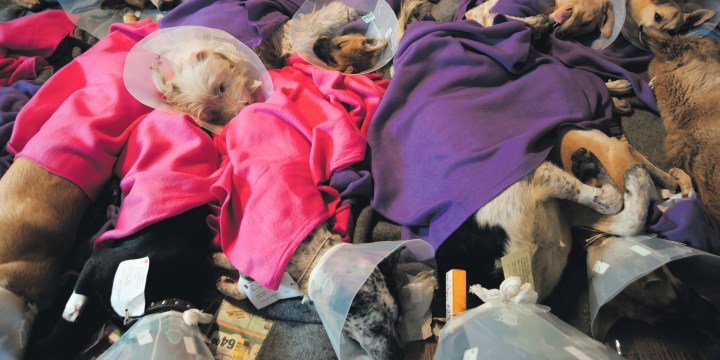
In the small town of De Doorns, dozens of vets are donating their free time to administer to the pets of people struggling to afford proper care.
Entering the hall, the yip, yap, bark, whine and occasional “Owoooo” was deafening, added to by people calling for additional supplies or cages and volunteers soothing frightened canines.
The appealing eyes of a dog in a cage bearing a label without its name demanded my attention. It sniffed my hand, accepted a chin scratch and thanked me for my reassurance with a tail wag, but his eyes betrayed anxiety.
Within his sight, struggling dogs were being held and injected with anaesthetic then carried, feet up and probably to him seemingly dead, to tables where vets with shiny implements were cutting into them. I didn’t have the heart to let on that he was soon to lose his testicles.
One vet I talked to, as she fished out an ovary for extraction, had spayed 12 bitches that morning. Her neighbour was doing testicles at an even greater rate.
Taking place was a mass sterilisation drive which takes place every two months in De Doorns, a Western Cape village in the Hex River Valley. There would be more than 190 operations scheduled for that day, with 13 vets working free and flat-out. It’s an area with poor communities of mainly seasonal workers for the surrounding wine farms… and lots of dogs.
With cellphone, notebook and pen in hand, the sterilisation process was being anchored by the calm, elegant presence of Rachael Sylvester, who started and runs Sidewalk Specials, an NGO supported by vets and volunteers who offer their services free for up to three days every two months and work like… um… dogs. One vet I talked to, as she fished out an ovary for extraction, had spayed 12 bitches that morning. Her neighbour was doing testicles at an even greater rate.
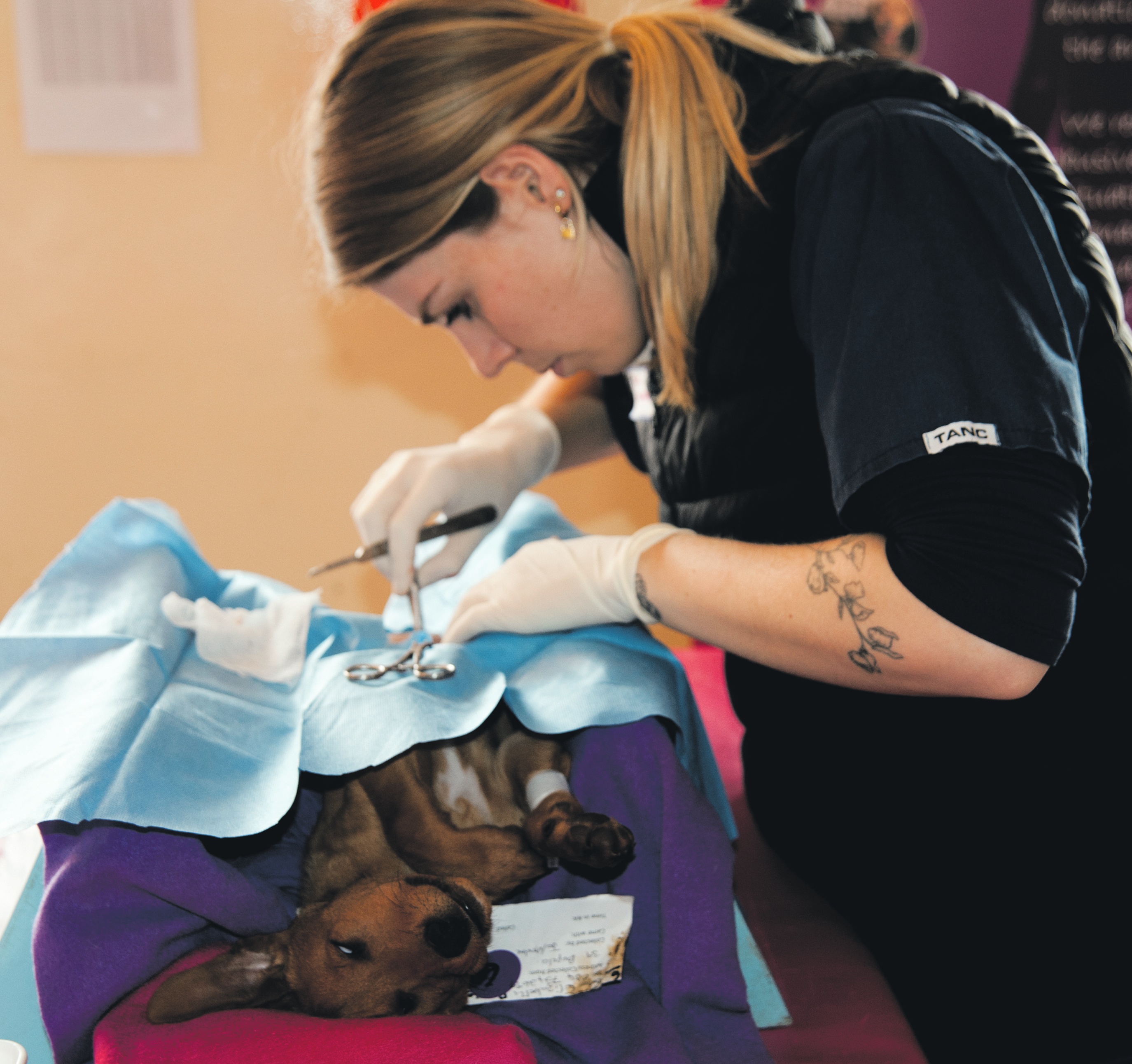
Teams of vets operate for several days during the mass sterilisations. Western Cape. (Photo: Don Pinnock)
The animals were all first being checked and – if necessary – treated for any ailments. After their operations, they were wrapped and laid side by side, warmed by about 100 constantly refilled hot-water bottles, to sleep off the anaesthesia. Volunteers were fussing over them, massaging them to keep circulation going and to wake them up. Sleep space was in short supply, so a vigorous rub and the aroma of some choice cat food under their noses generally did the trick.
The scene was both endearing and comical. The dogs resembled a collection of oversized dolls when asleep, but stumbled around like tipsy patrons once awakened. Gradually, they learnt to stand again, adapting to the plastic cones around their necks to prevent licking.
At that point the transporters took charge, loading them onto trailers for the journey back to their owners. Along with each dog went a blue bag of food, antibiotics, instructions for their care and, if necessary, a kennel. The entire operation was being carried out with military-style efficiency and an abundance of goodwill.
“When we first started in De Doorns people said going into the township was dangerous and that people didn’t care for their dogs,” a volunteer told me. “There are sometimes problems if someone gets drunk and makes demands, and some places are dicey, but generally people love and respect what we do and they mostly do care for their dogs. They just don’t have the money to sterilise them so the dog population grows.”
Underlining that, two youngsters – a boy of about 12 and his sister, about eight – arrived at the reception table outside the hall with their dog in their arms. “Kan jy asseblief die operasie vir haar doen? Ons wil nie meer hondjies hê nie” (can you please do the operation for her? We don’t want more puppies) the boy asked. “Ons sal wag” (we’ll wait). Three older boys strolled up with a pitbull in peak condition (plus new harness and lead) for a “check-up” then hung around, fascinated by the goings on.
Outside in the food tent with two volunteer chefs cooking free vegan lunches, I came across Janelle Maistry taking a breather. “This is real vet work,” she said, “the sort of stuff I trained for, making a difference in a community and helping animals.” A colleague sat down next to her, took off her shoes and massaged her feet. “I’ve been standing operating for six hours,” she confided, “it’s hard on the feet.”
The birth of an idea
Rachael’s journey began as a model and actress in London, but she yearned to return to South Africa. A boyfriend delayed her by giving her a French bulldog puppy, but she was miserable in London and unable to safely fly a brachycephalic dog, so eventually after many tears her parents ended up with the dog and she booked a flight to Cape Town.
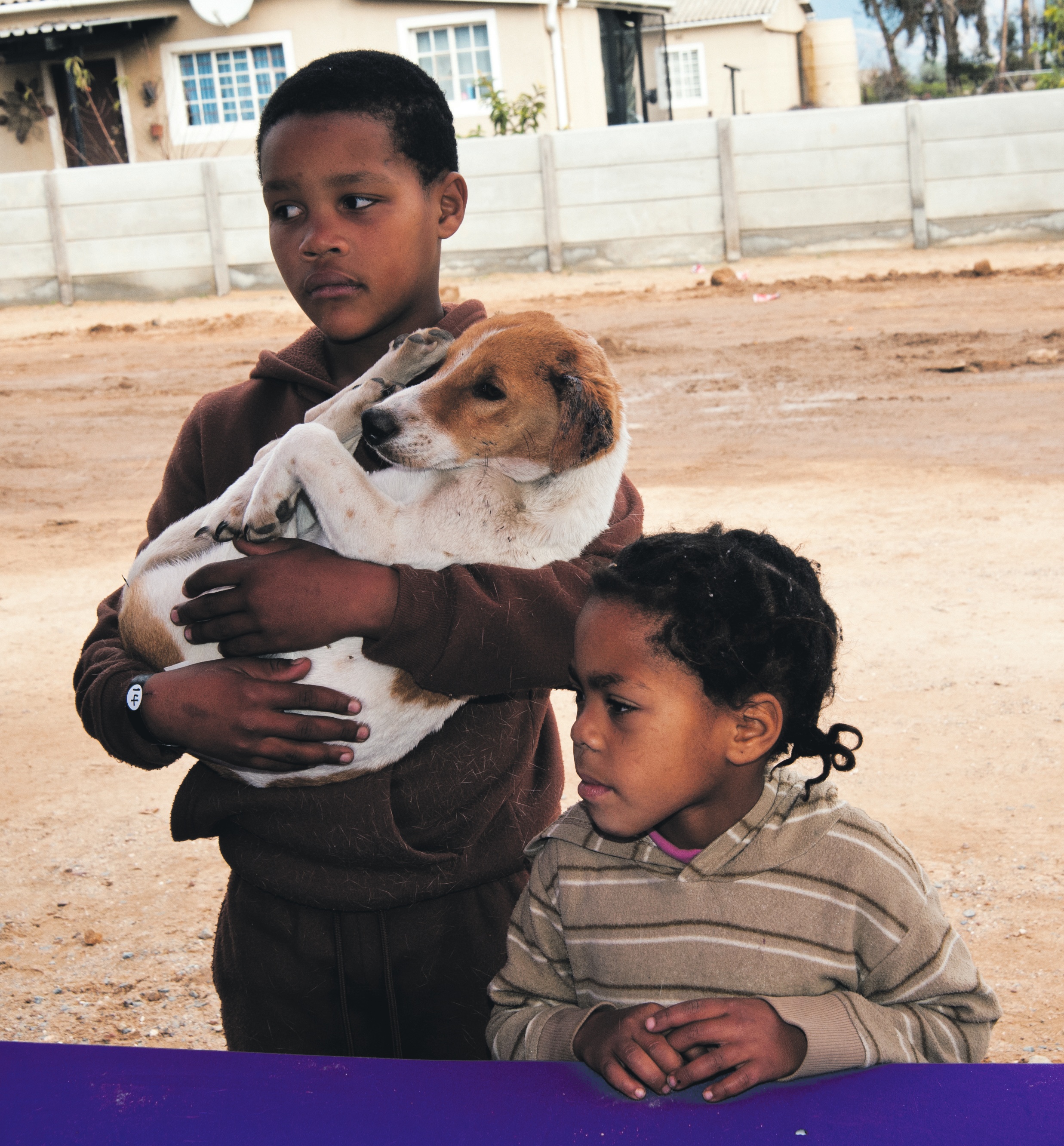
Children from De Doorns bring their pet in for care. (Photo: Don Pinnock)
But in a dog-friendly flat in Cape Town and no dog, she fostered one. “I fostered a dog named Buster. He was the first foster dog I found a home for. He was rehomed with a guy called Gary who now, seven years later, is head of Sidewalk’s outreach programme. It got me going. I started a Facebook page called DARG Foster Mom. It was so much more fulfilling than acting or modelling.”
“I’d pull dogs from euthanasia lists in the Witzenberg area and immediately post on social media that I was coming into Cape Town with maybe 24 dogs that needed foster homes. And people would drive out to meet me. They’d look after them while the vets fixed them up. Sometimes I’d have around 14 dogs in my Camps Bay flat.
“After a year of doing that it was getting crazy. All over organisations like us were just warehousing saved dogs at great expense and meanwhile dogs were just breeding relentlessly and nobody’s stopping it.”
On the day there was a queue round the farm – people queued for 10 hours seeking care for their dogs.
For Rachael, the concept of dog shelters and rehoming – taking dogs from poor areas and rehoming them in wealthy areas – seemed all wrong. It was okay for that animal, but it wasn’t solving the problem. “You were just reacting. Taking dogs away from people because of mistreatment, without educating the owners on what needed to be changed, meant that story would just repeat for their next dog.”
She was rescuing dogs from vets that had been brought in to be euthanised, providing them with veterinary care and sterilisation, then rehoming them. Eventually she wanted to see where the dogs were coming from. She visited townships in Ceres and Wolsley and found dogs having litter after litter, puppies dying because people couldn’t afford to feed them and sick dogs everywhere. In these areas, Rachael, along with Sidewalk Specials head vet Dr Reena Cotton, held their first township mass sterilisation – the first event dealing with 90 animals in a day.
Read more in Daily Maverick: Animal consciousness – why it’s time to rethink our human-centred approach
Rachael heard of a woman in De Doorns selling hot dogs to pay for sterilisations and contacted her. The woman outlined the problem but said the De Doorns township was a no-go area. Too dangerous.
“I contacted a guy there who agreed to take us around. It was bad; dogs in terrible condition everywhere. I decided this is where Sidewalk Specials would focus our mass sterilisation efforts. A local farmer offered a small hall for the event, we invited our volunteer vets and passed leaflets throughout the township. We weren’t sure how, or if, the township would even respond.”
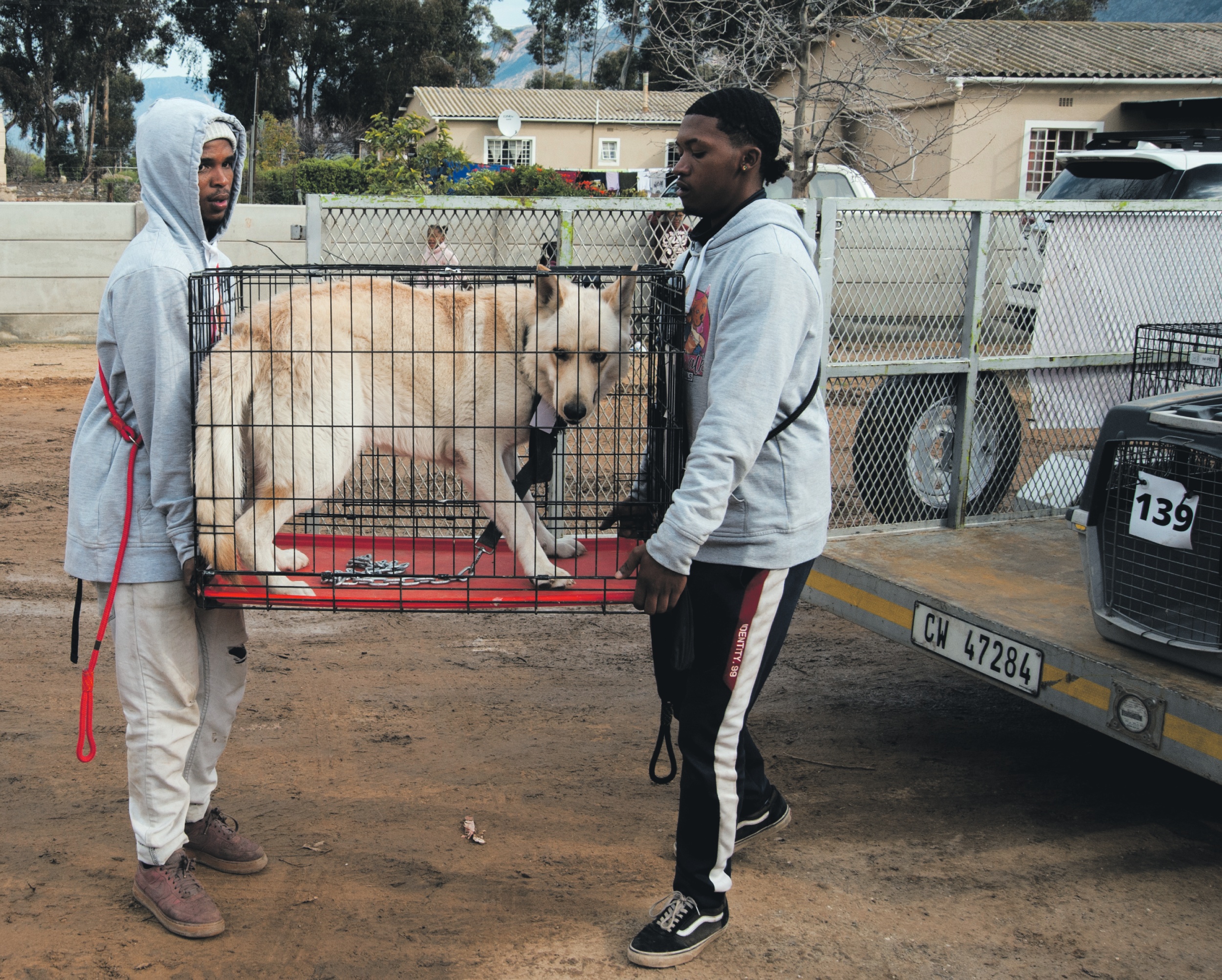
A neutered dog is delivered back to its owner. (Photo: Don Pinnock)
On the day there was a queue round the farm – people queued for 10 hours seeking care for their dogs. Her team learnt the intricacies of a mass sterilisation drive the hard way. At the end of the day there were about 50 puppies people didn’t want and no addresses of where they came from.
“It wasn’t as if people didn’t love their dogs,” Rachael told me. “It was just they couldn’t afford to look after them when they were having litter after litter. Their kids were watching puppies die and, as a child, you can’t form a caring bond with a pup which you know is going to die.”
Underprivileged pet owners have the exact same instincts you have and the exact same loves you have.
Her team started doing outreach, going to schools and families, and forming a relationship with the community. They’d walk the streets, talk to people and get them to sign up for sterilisation. They would then collect their dogs and return them afterwards, always with food and medication and quite often a kennel as well.
“We don’t scold, argue or force our views, we just offer,” said Rachael. “People know who we are, we respect them, they respect us, for us there’s no danger going in there.”
Learning by caring
Sidewalk Specials started a website with the motto Sterilise, Educate, Rescue – and the trolls began. “We’d get anonymous posts saying black people don’t care for animals, that we should euthanise all township dogs. But those fucking high-minded people couldn’t walk a mile in their shoes, couldn’t live their life.
“Some would say we should be helping the people, not their dogs. But we can’t do everything. Helping kids to care for their dogs helps them grow up caring for people. People, especially children, naturally love animals. You don’t have to teach them that. When we treat their animals and they live a long, healthy life, a bond develops.
Read more in Daily Maverick: Pit bull attacks in South Africa – a historian sheds light on the issues
“Underprivileged pet owners have the exact same instincts you have and the exact same loves you have. There is nothing racial about poverty or caring. It’s just if you can’t keep something alive and you can’t protect it, you can’t prevent disease, you’re not going to get close. Why would you keep ripping your heart out? But if the animal is protected against disease and it won’t breed itself to death and is going to live at least to 10, you’re going to love your dog.
“We had a guy bring his dog in with advanced cancer and we had to put her down. He had walked the path with her for all those years and brought her in so she could die well and wanted to be with her to the end. That’s a success story. That’s caring.
Making it all work
Sidewalk Specials, the day I was there, had 13 veterinarians from all over the province, five vet nurses and about twice those numbers of volunteer helpers, including pick-up and drop-off teams and two women providing vegan lunches for everyone – all working flat-out for two days for free. There was also a small media team documenting the process and streaming it on YouTube. The space, a hall offered by a farmer, included a fully equipped theatre with an anaesthetic section and operating tables with all the necessary equipment for first-class treatment.
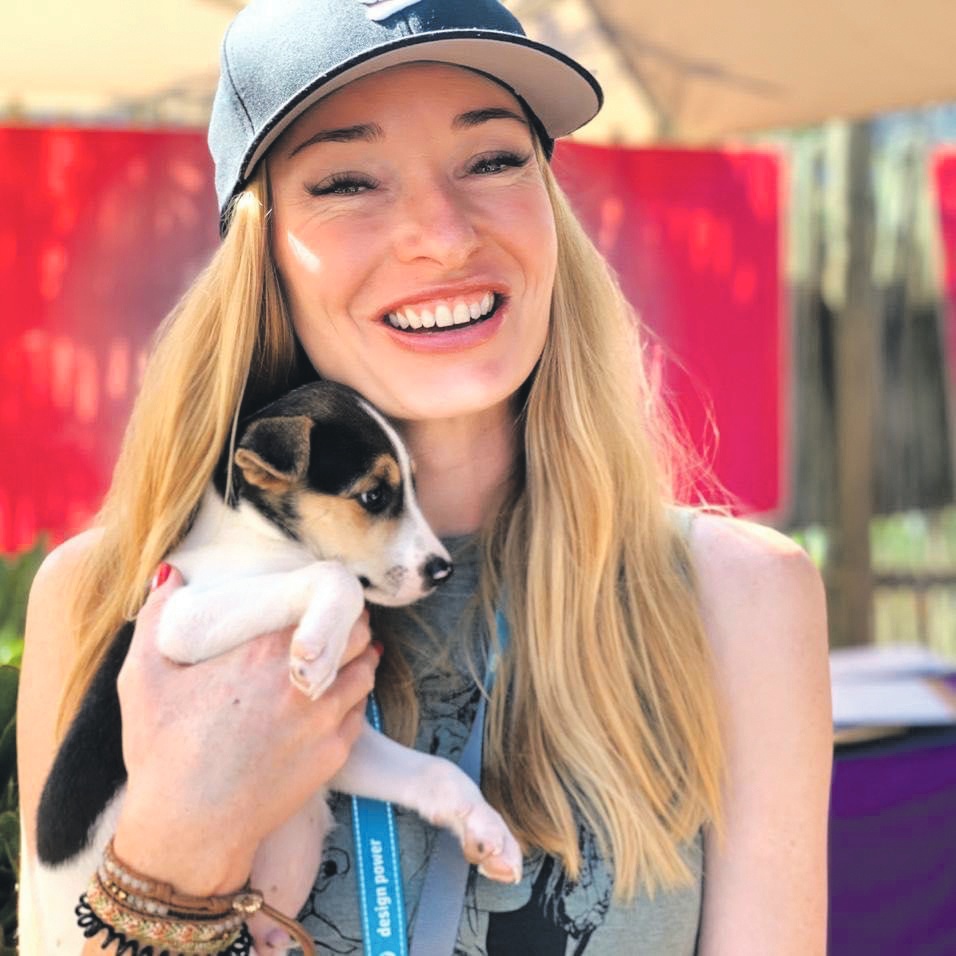
Sidewalk specials owner Rachael Sylvester. (Photo: Supplied)
“We are funded by international and local funders and a few trusts who know that almost everyone works for free,” said Rachael. “There are few overheads and most of the funds go directly into equipment and care for animals. We’re not burning into funds, hoarding capital. Money goes exactly where it’s meant to go and you can watch us doing it online as it happens. We know what we’re doing, we show what we’re doing and the right people come on board.”
Rachael gracefully declined to comment on organisations that only rehome. “A lot of people get caught up in rescue politics. I’m not interested. I stay in my own lane. As far as I’m concerned, I work for the township of De Doorns and that’s how I see it. I’m not criticising anybody. I don’t need to know what anyone else is doing.
“I look at it this way,” she said. “Instead of constantly trying to rehome dogs from poor conditions, it would be best if they weren’t born at all. Don’t let another 20 puppies come into life. Rather look after the animals that are already alive.
“When we started in De Doorns, we’d drive around and collect dozens of animals desperately in need of care within an hour. Now, after seven years of working there, it’s just one or two over a full day. Things are changing. But it only takes one unsterilised bitch making 10 puppies twice a year who live to each make 10 more puppies, and you see the problem. It’s exponential. We can’t stop what we do.” DM
For more information, contact Sidewalk Specials through their website.
This story first appeared in our weekly Daily Maverick 168 newspaper, which is available countrywide for R29.
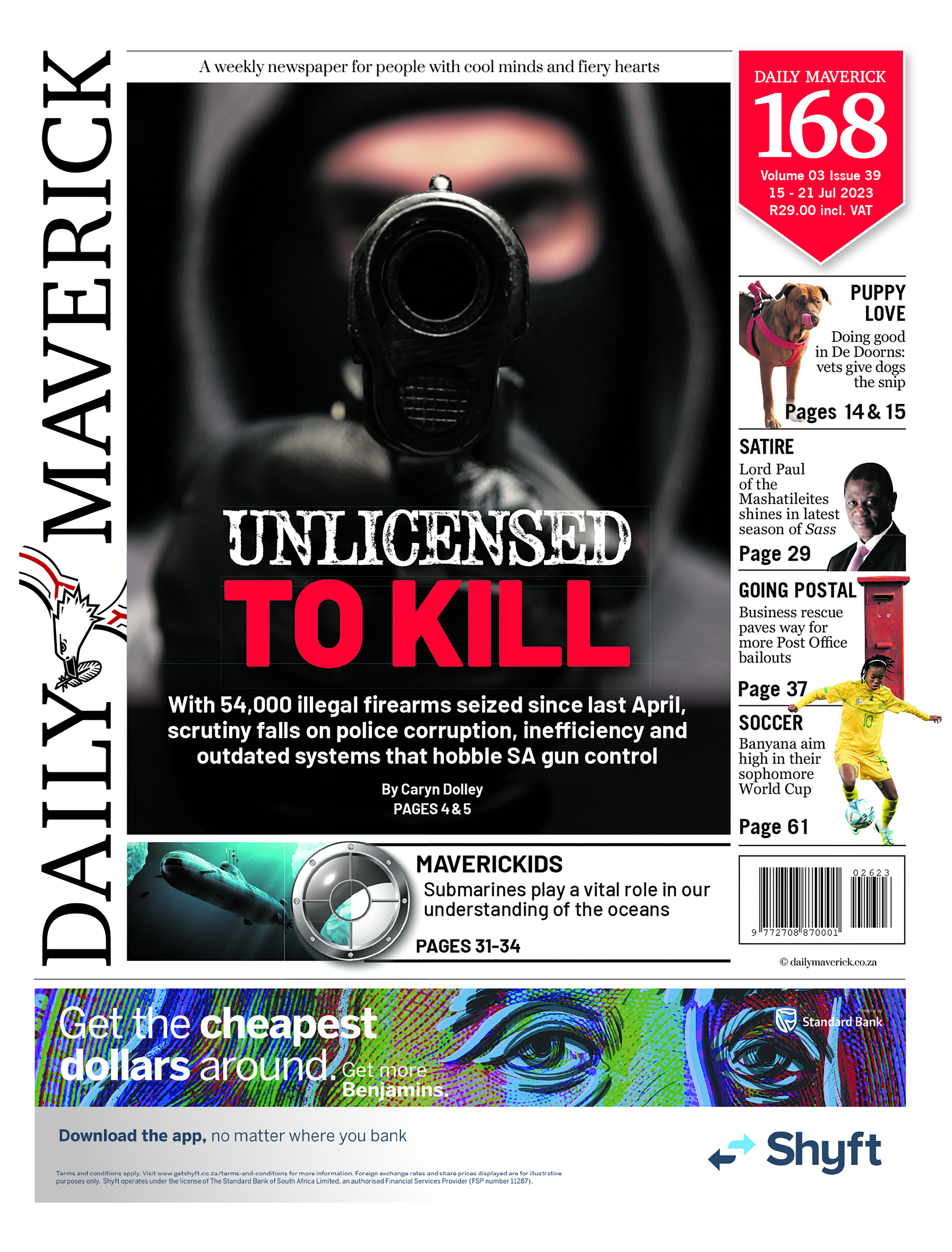





















 Become an Insider
Become an Insider
A wonderful, feel-good story. Thanks DM for shining a light on these amazing people who donate their time and skills to help people enjoy responsible pet ownership.
This is amazing. Every township should have one. I would love to get involved in something like this. The difference they are making is tremendous. I’m so impressed, really.